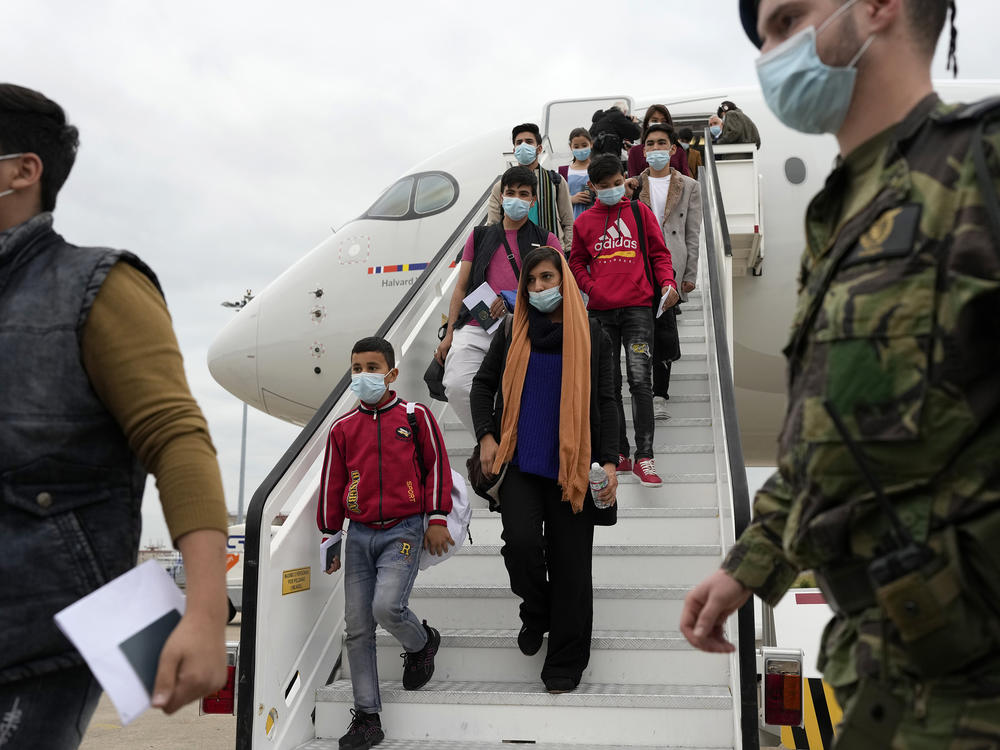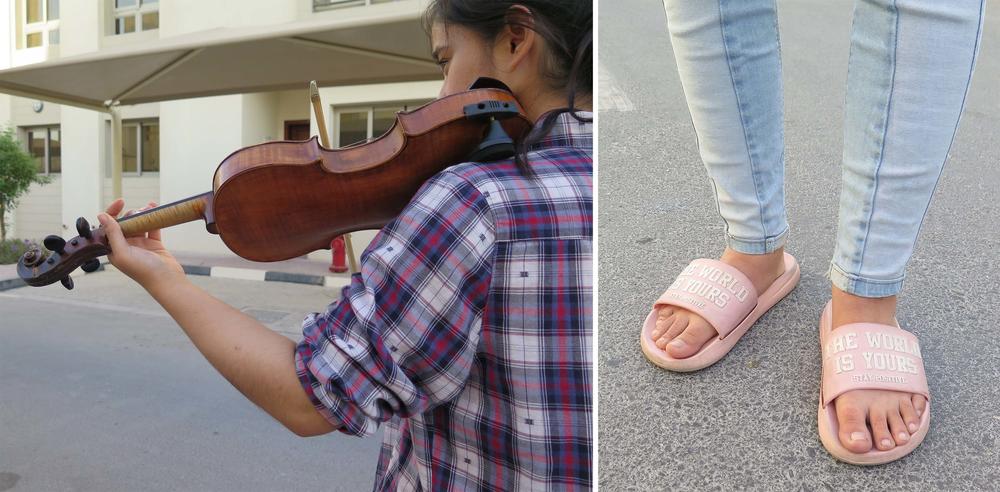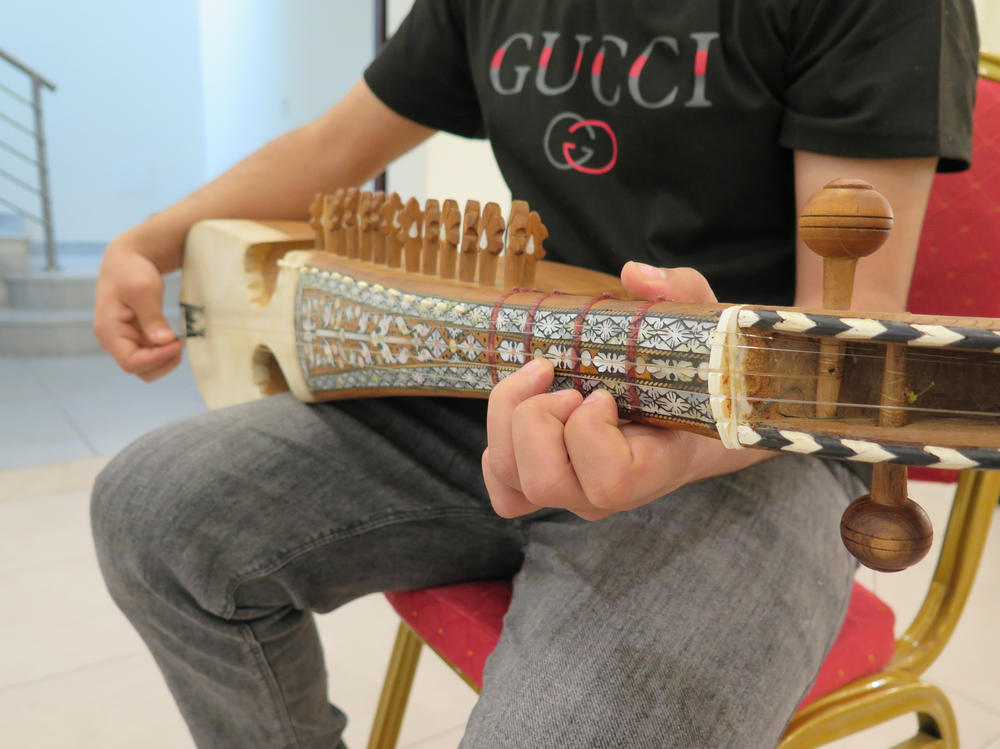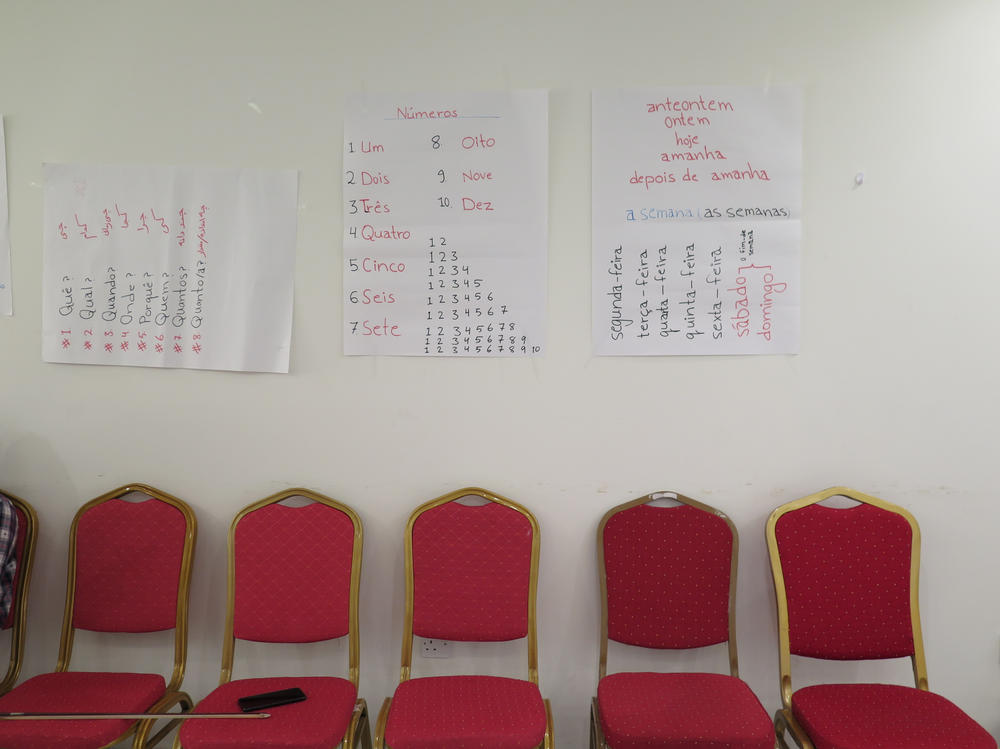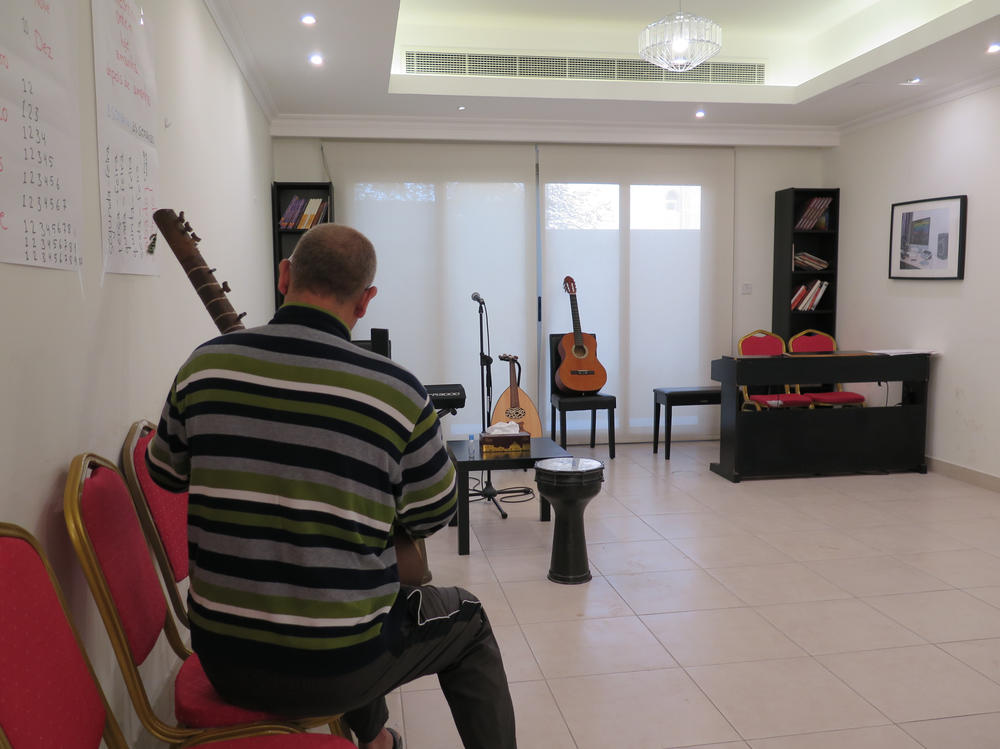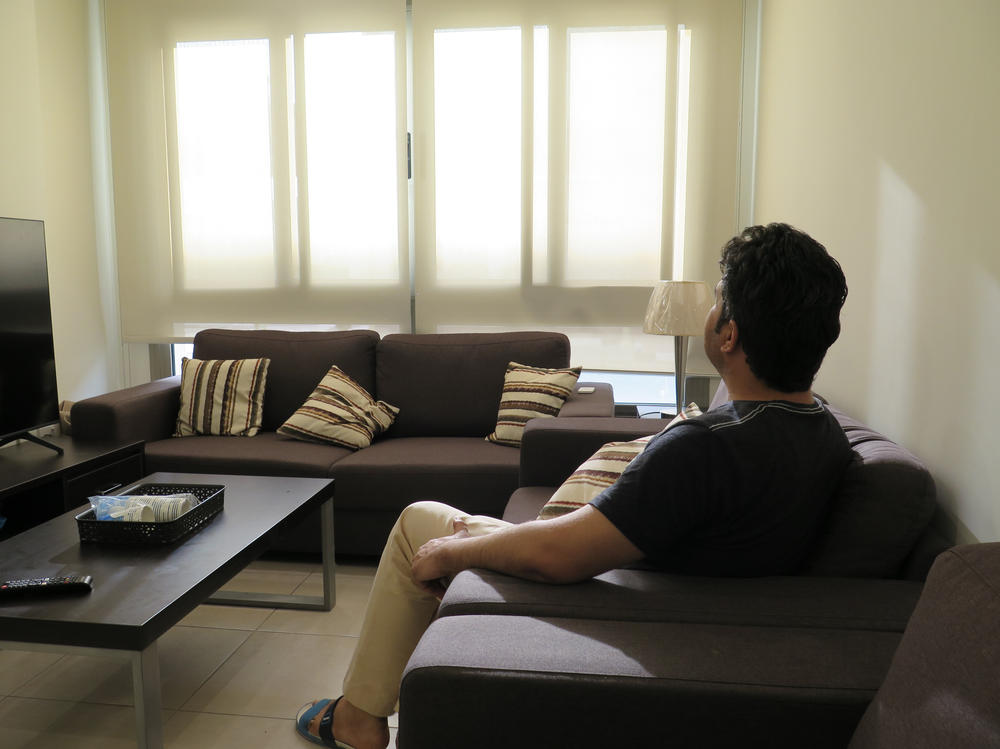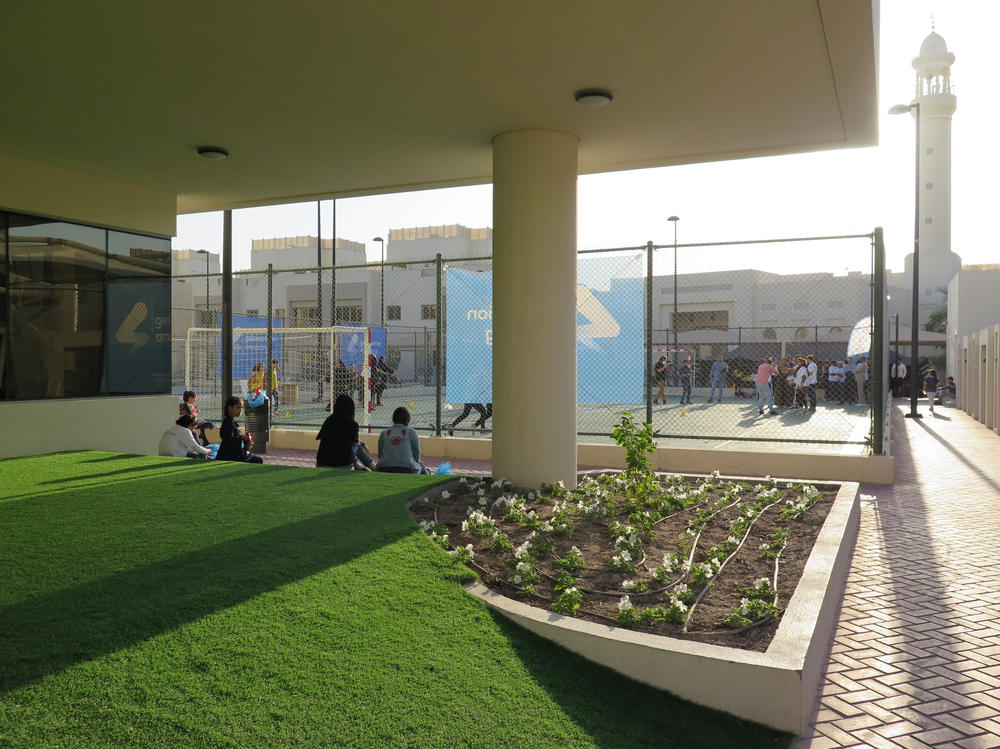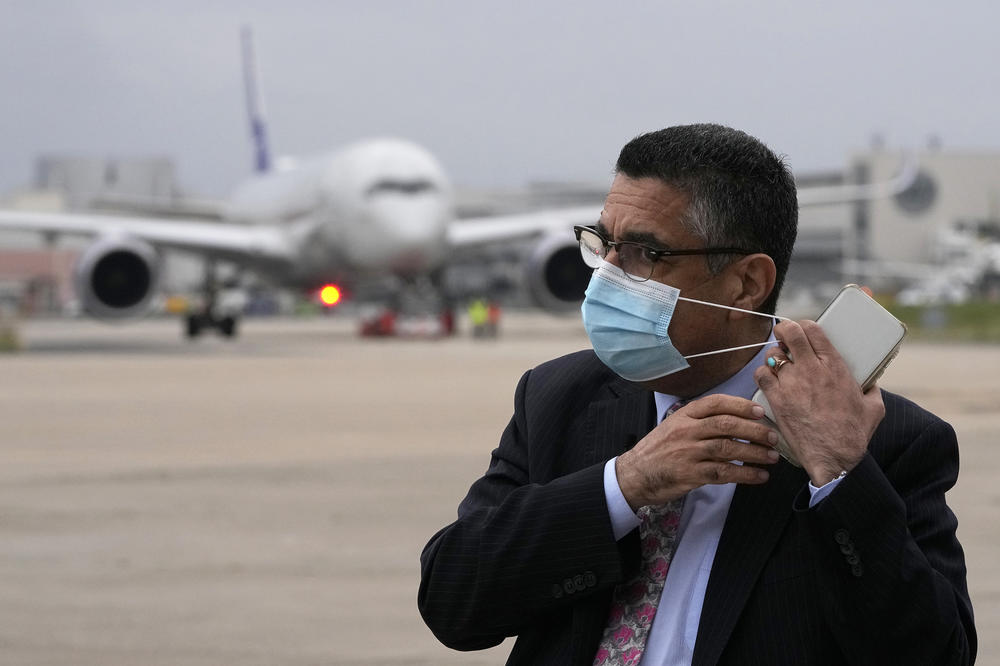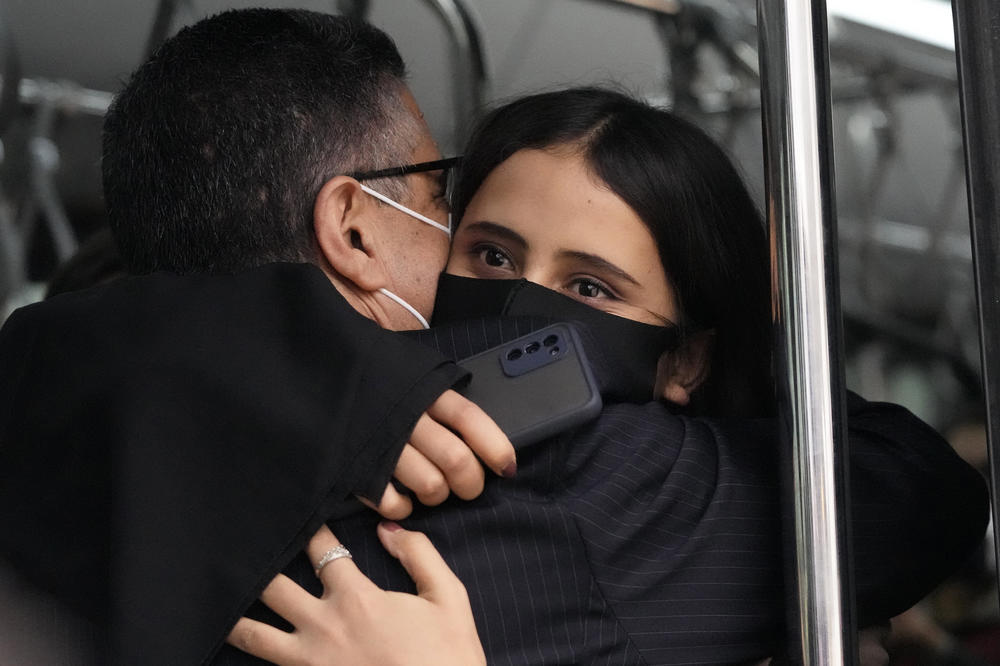Section Branding
Header Content
Afghan music students escaped the Taliban and are beginning their new lives abroad
Primary Content
DOHA, Qatar — On the outskirts of Qatar's capital, there's a gated residential compound that was built to house dignitaries attending the 2022 FIFA World Cup. But since August, Park View Villas has been repurposed as a temporary home to thousands of Afghans who were evacuated after their country fell to the Taliban. It's a way station while they wait to be resettled in various other countries.
Beyond the compound's guards and white metal gates, there are quiet lanes, carefully tended grounds and rows of townhouses. There's a nursery that serves as a community center, a soccer field, playgrounds and a supermarket subsidized by Qatar, providing food and basic supplies free of cost.
From one of the townhouses comes the sound of music. Inside, there's a bright classroom where students are practicing Afghan instruments — drums called tablas and dhols, a plucked string instrument called a rubab. There's a guitar leaning against the wall, a keyboard and mic stand.
It's a classroom for students and faculty of the Afghanistan National Institute of Music — Kabul's first and only music academy, an internationally famous school teaching Afghan and Western music. After the Taliban took over Afghanistan, members of the institute feared for their lives. After five airlifts starting Oct. 2, nearly 300 students, faculty and family members affiliated with the music school all made it safely to Doha by mid-November.
On a recent visit, the classroom walls were covered in large, handwritten sheets of paper showing basic vocabulary, verb conjugations and phrases in Portuguese — preparation for the group's next destination. Last week, the entire group of 273 landed in Lisbon on an SAS charter flight. They plan to rebuild their school — and lives — in Portugal, which has granted them asylum. The youngest among them are newborn baby boys; the oldest are grandparents in their 80s.
For the musicians, there's relief combined with sadness
One of the students, 18-year-old violinist Sevinch, is wearing jeans, and on her feet are pink slides with the message: "The world is yours. Stay positive." NPR is not using the full names of students and staff affiliated with the school because they still have family in Afghanistan and want to protect their privacy.
Sevinch began studying the violin eight years ago. She's also a conductor of the Zohra Orchestra, the institute's celebrated all-female ensemble, whose 250 members range in age from 12 to 20. They have performed Afghan folk music and Western classical music all over the world. They play a few other songs, too.
"I love ABBA," Sevinch says, laughing. "I Have a Dream" is one of her favorite songs.
When she landed in Doha in Nov. 15, on the final airlift of music institute members, Sevinch was relieved. But at the same time, she says, "I was so sad. Yes, I was so sad — because I love my country, my people."
She had to leave her violin behind, and borrows one from a friend to practice on now. One of her fellow students, Fayaz, 19, feels lucky to have kept his own instrument as he escaped Kabul.
On his rubab, inlaid with mother of pearl, Fayaz plays a Pashto song called Da zamong zeba watan, "Lovely Homeland." When he finishes, the final notes dissolve and the room is quiet.
Wali, the institute's program manager, pauses before speaking.
He sighs.
"When we were in Afghanistan," he says, "it did not feel like that. But here, it feels different."
There's a Portuguese word that sums up how this song makes them feel now — saudade. It refers to an intense longing, a sense of melancholy. Many of the students left parents and other loved ones behind. Most evacuees could bring very few belongings with them. They're facing a future in an unfamiliar place.
"Sometimes we feel happy, we are safe," Wali, 38, says. "But at the same time, leaving your world behind, your homeland, whatever you have, is extremely tough, extremely tough. But we will never lose hope one day we could return back to Afghanistan."
For now, that possibility seems remote.
The Taliban banned music the last time they were in power
With the Taliban in power, "It's clear that the music is not welcome in Afghanistan," says Ahmad Sarmast, the Afghan music institute's founder and director. "From the day that the Taliban returned back to Kabul, you see that Afghanistan has been [turned] once again into a silent nation."
The Kabul music institute's premises were confiscated after August, he says, its facilities dismantled. Sarmast says he "tried to establish a channel of communication with the Taliban in order to encourage them to ensure the musical rights of the Afghan people, and also to ensure and encourage them to allow the Afghan youth, Afghan children, to continue their music education." But, he says, "I've never been able to get that precise answer from the Taliban, whether we can return back to the school or not, whether we can resume activities or not."
The last time the Taliban ruled Afghanistan, in the 1990s, they banned music, declaring it un-Islamic. They ripped cassette tapes apart and strung them up on trees and street posts. They broke instruments and punished and shamed those who played them. Many Afghan musicians buried their instruments and fled to neighboring countries, where they eked out a living as wedding musicians or by doing other work.
Basir, an ustad, a master musician and teacher, remembers that time all too well.
"We were able to play music and listen to music until the Taliban came," he says. "When the Taliban came, it stopped."
He fled to Tajikistan and returned after the Taliban fell in 2001. He later began teaching at the music school, which was founded in 2010. In more than 20 years of teaching, he says, he's probably had a thousand students.
When he fled to Doha this fall, he had to leave all his musical instruments behind. He hid his bass guitar, electric guitar and another, traditional string instrument called a tanbur inside a water tank on the roof of his house.
These days, he plays a borrowed tanbur, but he thinks about his own instruments every day. To him, they're like old friends.
"I share all my feelings with my music instruments," he says. "When I'm happy, I'm playing. When I am sad. When I am worried. It helps me feel like relax and release. I always talk."
Students like Fayaz, who weren't born when the Taliban were last in power, grew up hearing terrifying stories about that era — a time when Afghanistan was mired in grinding poverty, largely cut off from the world, and the Taliban's harsh interpretation of Islam meant they held public executions, chopped off hands of thieves and suppressed women's rights. They blew up the colossal Bamiyan Buddha statues, powerful symbols of Afghanistan's ancient cultural heritage.
After the Taliban fell in late 2001, opportunities for artistic expression grew, especially in Kabul. Universities offered arts education, street art flourished, cinemas reopened and pop music took off, as did televised singing competitions such as "Afghan Star."
Fayaz and the institute's other musicians feared the worst on Aug. 15, the day the Taliban took over. He was at the institute when he got the news, which interrupted his performance of a recording for children with his ustad.
"I received a call from my family and they told me that the Taliban entered Kabul. 'Please come home.' My hands and my legs were shivering and I thought that I would never be able to listen, to play music or to perform such beautiful music of Afghanistan again," Fayaz says.
He'd never glimpsed the Taliban in person, and was frightened by the sudden sight of them in his city.
"Music is the food for soul," he says, "helps my soul relax. Taliban kills, but music does not kill. And music is not a killer."
The music institute's founder has an ambitious agenda for its future
This time, so far, Taliban authorities have not explicitly banned music, though individual Taliban have harassed or threatened musicians on the ground. In response to a query from NPR about the Taliban's stance on music, the group's political spokesman in Doha, Muhammad Naeem Wardak, equivocated, saying, "With regard to music, as you know, there is a difference of opinion among Muslim scholars on this subject. Accordingly, we defer this issue to the scholars."
Sarmast says at the moment, the only way he can imagine the music school returning to Afghanistan is either "the removal and the collapse of the regime of the Taliban" or "a proper change and proper policies and proper assurances that the musical education will take place back in Afghanistan."
He says the Taliban have made it clear for now that they'd prefer musicians to make a living by other trades, something none of the Afghan conservatory students or faculty wish to do.
Sarmast's goal, now that everyone is back together again, is not merely to reconstitute and replicate the Afghan music institute in Portugal — but to expand it into a cultural center that serves those beyond the Afghan community, including refugees from other countries and disadvantaged children of all backgrounds.
Last Monday, he was waiting at a Lisbon military airport to welcome everyone when they landed. "Oh, it was an unforgettable moment," he says. "That was the end of a very long journey to freedom at a time that students eventually — after many, many months of stress and fear and hopelessness — eventually got to freedom, and once again get that opportunity to dream and to chase their dreams."
For Sevinch, the main thing now is to resume violin practice. "We're excited," she tells NPR via a WhatsApp message from Lisbon, "and waiting for our lessons to begin."
Copyright 2021 NPR. To see more, visit https://www.npr.org.
